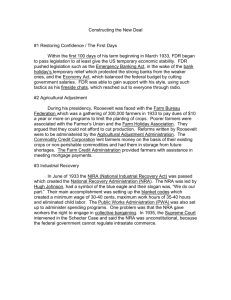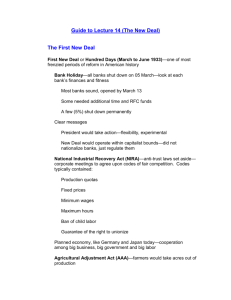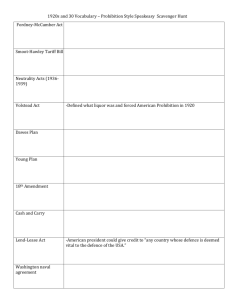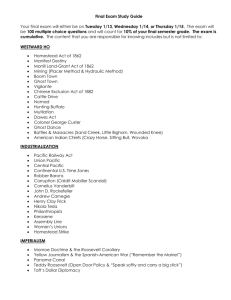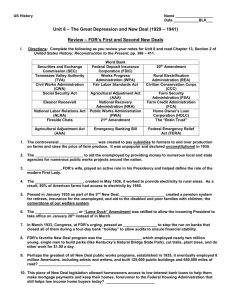NEW DEAL PROGRAMS
advertisement
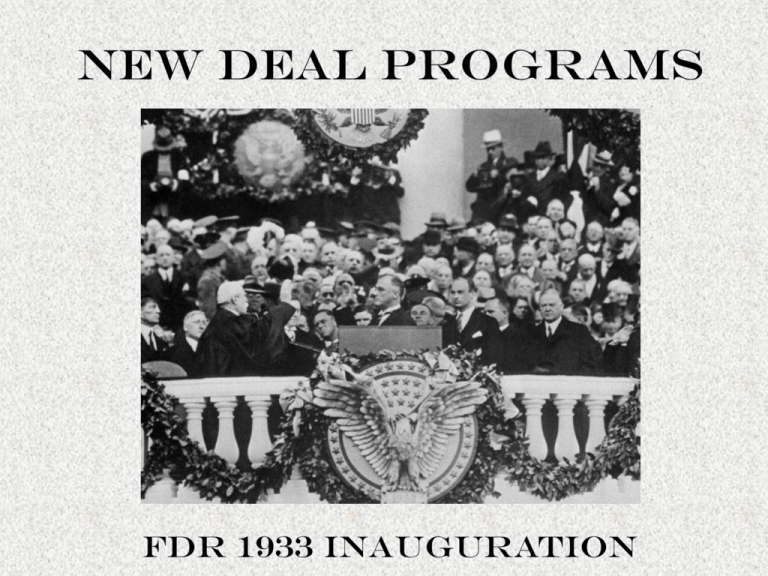
NEW DEAL PROGRAMS FDR 1933 Inauguration BANKING • Reconstruction Finance Corp. – From Hoover, kept by FDR, loaned $ to banks to stay open • “bank holiday” – FDR closed all banks right after his inauguration • Emergency Banking Act – reopened those banks with the funds to be safe; increased govt. oversight of banks Newspaper Reports FDR’s Quick Action BANKING FDR delivers his first fireside chat • “fireside chats” – first of these radio talks to the nation by FDR focused on getting people to put money back into the recently reopened banks • F.D.I.C. (Federal Deposit Insurance Corp.) – protected up to $5,000 in individual deposits in banks FARMERS • Dust Bowl (1930-1936) – dust storms caused by severe drought in which the fertile soil of the plains was blown around and farms were ruined FARMERS • Farmer’s Holiday Association – farmers withheld grain and livestock from market (1932) • Wisconsin Milk Strike – dairy farmers dumped milk to prevent it from going to market in hopes of raising the price on milk (1933) Wisconsin Farmers Breaking Milk Bottles FARMERS • Farm Credit Administration (1933)– provided loans to farmers to meet farm payments • A.A.A. (Agricultural Adjustment Act) – provided subsidies to farmers to produce less FARMERS • Resettlement Administration (1935) – gave loans to tenant farmers to buy their own farms and to sharecroppers and migrant farmers to move to more profitable areas • Rural Electrification Administration (1935) FARMERS • Butler v. U.S. (1935) – Supreme Court case that struck down the A.A.A. • Soil Conservation Act (1935) – passed after A.A.A. was struck down; paid farmers to plant grasses instead of crops Soil Erosion Research Site In Oklahoma FARMERS • Farm Tenancy Act (1937) – created Farm Security Administration which loaned $1 billion to farmers to buy farms (replaced the Resettlement Administration) Tenant Farmers in a Cotton Field in Mississippi UNEMPLOYED / WORKERS • Federal Emergency Relief Act (1933) – $500 million to state and local relief agencies • Home Owners Loan Corp. (1933) – helped city dwellers to refinance home mortgages Soup Kitchen for the Unemployed UNEMPLOYED / WORKERS • National Industrial Recovery Act (N.I.R.A.) – created the Public Works Administration (P.W.A.) which provided jobs mostly in construction projects (1933) UNEMPLOYED / WORKERS • Tennessee Valley Authority (T.V.A.) – provided construction jobs, prevented soil erosion and flooding, and provided jobs operating the hydroelectric dams (1933) UNEMPLOYED / WORKERS • Civilian Conservation Corp. (C.C.C.) – employed jobless urban young men in projects like creating parks, reforestation, and soil erosion control (1933) UNEMPLOYED / WORKERS • Civil Works Administration (C.W.A.) – temporary public works agency (1933) C.W.A. Workers in New York City UNEMPLOYED / WORKERS • Works Progress Administration (W.P.A.) – expanded previous works programs to those of nearly all occupations (1935) W.P.A. Artist’s Work ► ◄ W.P.A. Sponsored Theater INDUSTRY / LABOR • National Recovery Administration (N.R.A.) – drafted codes for each industry for production limits, wages, prices, etc. (1933) – also part of N.I.R.A. like the P.W.A. INDUSTRY / LABOR • Schechter Poultry Corp. v. U.S. (1935) – a Supreme Court case that invalidated regulations on the poultry industry and essentially struck down the N.I.R.A. INDUSTRY / LABOR • Wagner Act (1935) – replaced the struck down N.I.R.A.; it allowed unions and collective bargaining and set up the National Labor Relations Board (N.L.R.B.), which oversaw its responsibilities and mediated between unions and management N.L.R.B. was designed to prevent problems like this police battle with striking truck drivers in Minneapolis, Minnesota in 1934 INDUSTRY / LABOR • Congress of Industrial Organizations (C.I.O.) – when the American Federation of Labor indicated reluctance to organize unskilled workers, John L. Lewis, who was president of the United Mine Workers Union, created the C.I.O. which attracted millions of unskilled industrial workers John L. Lewis INDUSTRY / LABOR • Sit-down strikes • Fair Labor Standards Act (1937) – gives sanction to the minimum wage and maximum work week of 40 hours Auto workers sitting on car seats inside a GM factory in Flint during 1937 UAW sit-down strike STOCK MARKET • Federal Securities Act (1933) – required corporations to inform govt. of all stock offerings (to try to end insider trading) • Congress abolished buying on margin (1934) • Securities and Exchange Commission (S.E.C.) – set up to enforce regulations on the stock market (1934) 1934 S.E.C. Meeting with Joseph Kennedy seated in center
